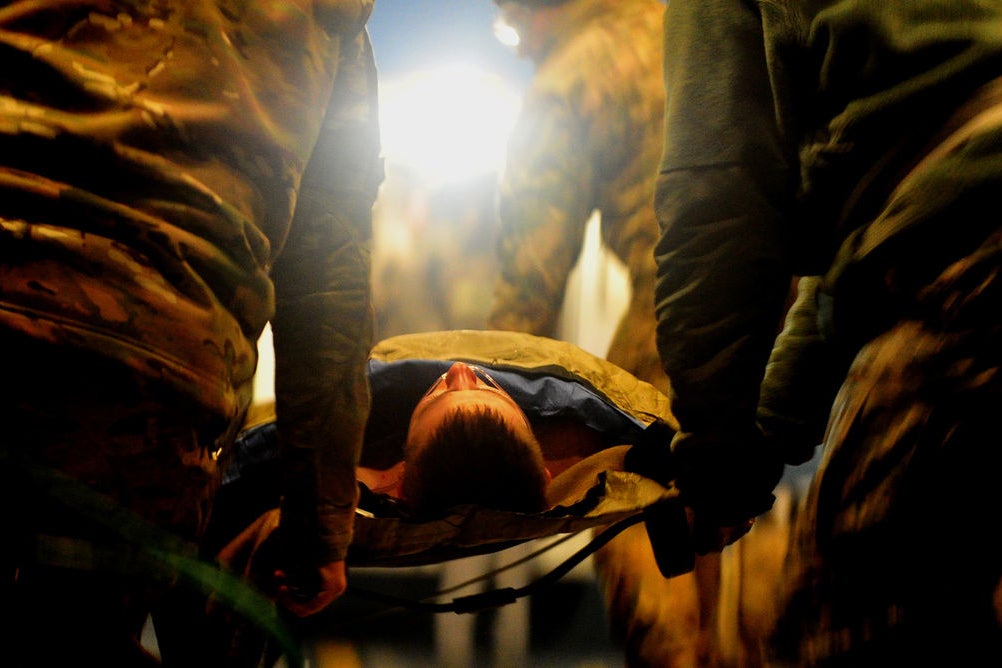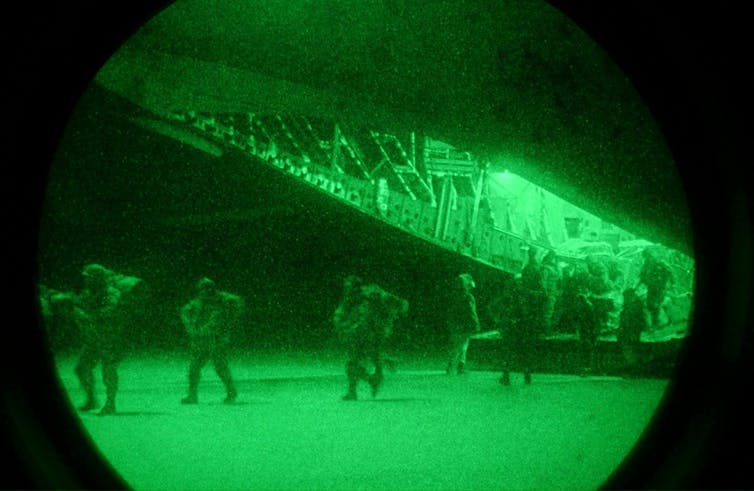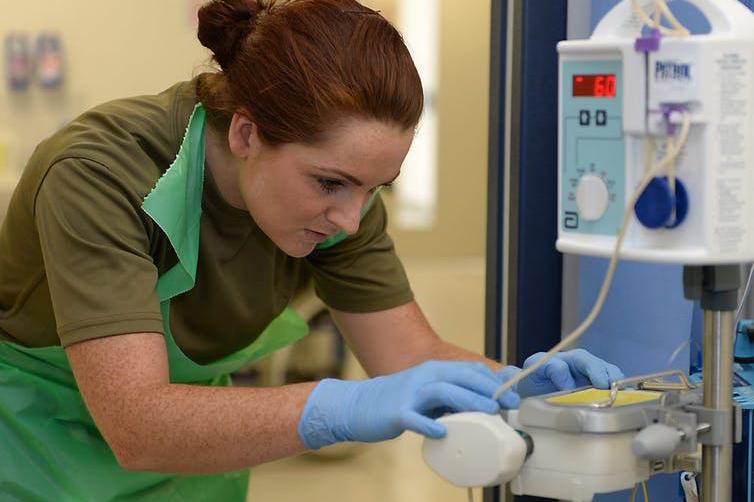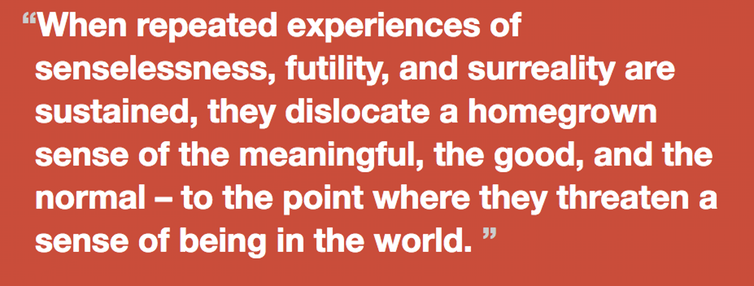Embedded with medics in Afghanistan, I witnessed the fall out of war
PTSD isn’t just reserved for those on the front line – my experience alongside a surgical team at Camp Bastion showed how it could affect anyone dealing with the fall out of war

Your support helps us to tell the story
From reproductive rights to climate change to Big Tech, The Independent is on the ground when the story is developing. Whether it's investigating the financials of Elon Musk's pro-Trump PAC or producing our latest documentary, 'The A Word', which shines a light on the American women fighting for reproductive rights, we know how important it is to parse out the facts from the messaging.
At such a critical moment in US history, we need reporters on the ground. Your donation allows us to keep sending journalists to speak to both sides of the story.
The Independent is trusted by Americans across the entire political spectrum. And unlike many other quality news outlets, we choose not to lock Americans out of our reporting and analysis with paywalls. We believe quality journalism should be available to everyone, paid for by those who can afford it.
Your support makes all the difference.Donald Trump’s about-face diktat that America is to galvanise its gig in Afghanistan was met with derision by many but will have caused others to sit right up. These will have included troops about to be dispatched to Afghanistan for a second, third or fourth helping of whack-a-mole, and especially those to be deployed in medical roles.
“The killers need to know they have nowhere to hide, that no place is beyond the reach of American might and American arms,” Trump said. “Retribution will be fast and powerful.” An additional 3,000 troops are to be flown to central Asia, to add to the 8,400 US troops already there. It’s well short of the estimated 100,000 troops active in Afghanistan during Obama’s surge, but Trump’s decision to continue an expensive and – given that swathes of the country are back under Taliban control – futile war is likely to inflict significant casualties on civilians.
Launched by the US in 2001 as Operation Enduring Freedom, the war toll is estimated at 104,000 Afghan deaths to date – among which 31,000 are civilian – with another 41,000 civilians wounded. These numbers exclude injuries and deaths among Nato military personnel, including 2,254 US soldiers (1,856 in hostile action) and 454 UK soldiers (405 in hostile action).

During the first of a six-week tour of duty with a surgical team at Camp Bastion’s field hospital, I witnessed 174 casualties taken into the emergency room. My embedded deployment, as an academic keen to understand how high-performing individuals solve problems collectively under difficult circumstances, took place in the summer of 2011, or one of the bloodiest periods of the war.
The opportunity to study, by observation, how it is these doctors come to develop ideas about their work and the war, fairness and cruelty, about themselves and the other, is unprecedented, and I was keen to try to reciprocate the hospitality and camaraderie I’d been extended. One such opportunity presented itself when I was asked (repeatedly) to help the public understand what war is really like from the medic’s point of view. Richard Hooker’s 1968 novel M.A.S.H. – a fictional account of a US army surgical hospital in Korea during the Korean War – had been the only book to do full justice to the surreality of their experience, the doctors said, and might I write a modern-day, nonfictional version of it?
One likes to think that writing a book is cathartic. Not so. Or at least not in this case. While the deployment ended in 2011, it took me another five years to write up the account: Doctors at War: Life and Death in a Field Hospital. Aside from an unpleasant (and ultimately unsuccessful) attempt by the UK’s Ministry of Defence to ban publication, what stalled the writing was a personal struggle to make sense of the experience.

I’ve no wish to claim I was more, or less, affected than anyone else by the goings-on in that field hospital. These things are hard enough to measure as is. We do know something about the incidence of post-traumatic stress syndrome (PTSD) among rear-located medics (or medical staff who operate in war zones but away from the front line), the available data suggesting that they suffer similar rates of PTSD to those on the front line despite not typically being exposed to risk of death or injury. This comparison is relevant insofar as the definition of PTSD assumes it to be caused in no insignificant part to precisely such exposure. So how might we explain the incidence of PTSD among the doctors and nurses I deployed with? And how might this help me understand my own experience?
A careful reading of my field notes suggests that the specific cultural, professional, and organisational contexts in which people who work at war are embedded can play a central role in the experience of emotional distress, regardless of whether they are directly exposed to combat. This is because these contexts can trigger and amplify repeated experiences of senselessness (witnessing the needless cruelty that is part and parcel of war), futility (the many times protocol required doctors to turn over patients they had stabilised to ill-equipped local facilities), and surreality (the disorienting, dreamlike quality of war). When these experiences are sustained, they can dislocate people’s homegrown sense of the meaningful, the good, and the normal to the point where they experience a threat to their sense of being in the world.

And perhaps this helps explain some of my own difficulties? My own expectations of the meaningful, good, and normal might differ in certain respects from those I spent weeks observing – after all, we were prepared for different professions – but this is not to say that they contrasted sharply from the felt experience of senselessness, futility, and surreality that many of us will still have shared.
Occasionally, this contrast resulted not from any professional expectation, but merely from my own expectation of what it is to be good and noble and, well, human. For example, I clearly remember feeling annoyed when, midway through our Friday pizza night routine, learning that yet another amputee had been flown in. To provide emergency treatment meant that our pizzas would grow cold yet again, and I felt physically sick at discovering my ever so slight sense of relief upon hearing that the casualty had been dead on arrival. What had happened to me?
What helped me process my own experience were the firsthand accounts of those who’d been at the sharper ends of war. In one of these, a US Army soldier found himself laughing at a man whose leg had been shot clear off, and how the man kept crawling around until he could no more, and thinking to himself, “that was a f*****g human being, you son of a b***h. You f*****g crazy b*****d, that was a human being you f*****g killed”. And yet, he said he’d do the same thing again, for “it’s like an evil thing inside your body”. To a monster, everyone is a monster, John Steinbeck wrote, and when war veterans – medics included – don’t talk about war it isn’t just because we won’t appreciate its horrors but because we won’t understand its surreality and pleasures.
I was never exposed to the thrill of the fight – and nor were the doctors – yet we were willing spectators to all that war destroys. As I write in the book, ours were the best seats in the house to a massacre that repels and intoxicates, a spectacle that flaunts humanity’s best and worst in not quite equal measure.
As Lillian Smith said: “The human heart dares not stay away too long from that which hurt it most. There is a return journey to anguish that few of us are released from making.”
And, as I worked my way through the account, and as I wrote at the time, I realised that I missed the surreal, adrenaline-fuelled world of war surgery, that the relevance of my scholarship paled in comparison, and that my fate was little different from that of the surgeon and soldier insofar as our pleasure is often proportionate to another’s pain.
Mark de Rond is a professor of organisational ethnography at Cambridge Judge Business School. This article was originally published on The Conversation (theconversation.com)
Join our commenting forum
Join thought-provoking conversations, follow other Independent readers and see their replies
Comments